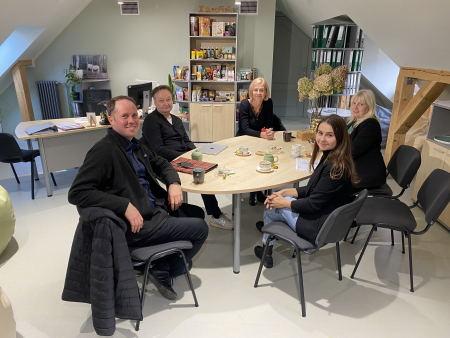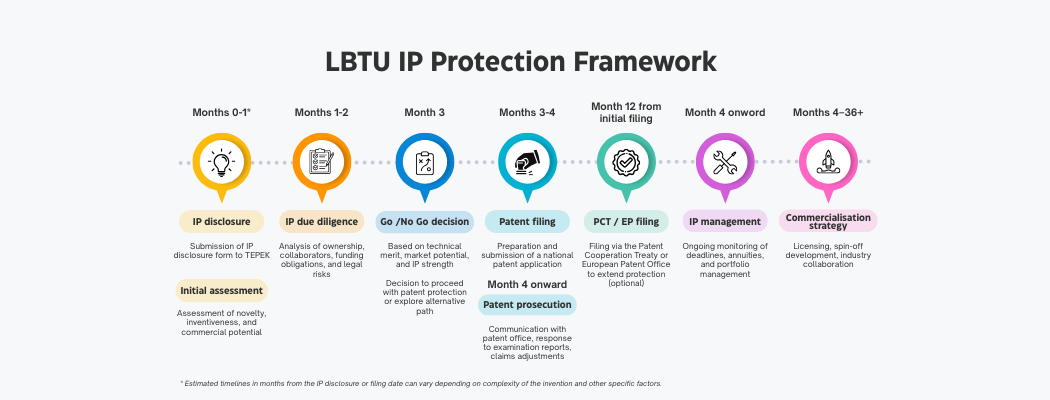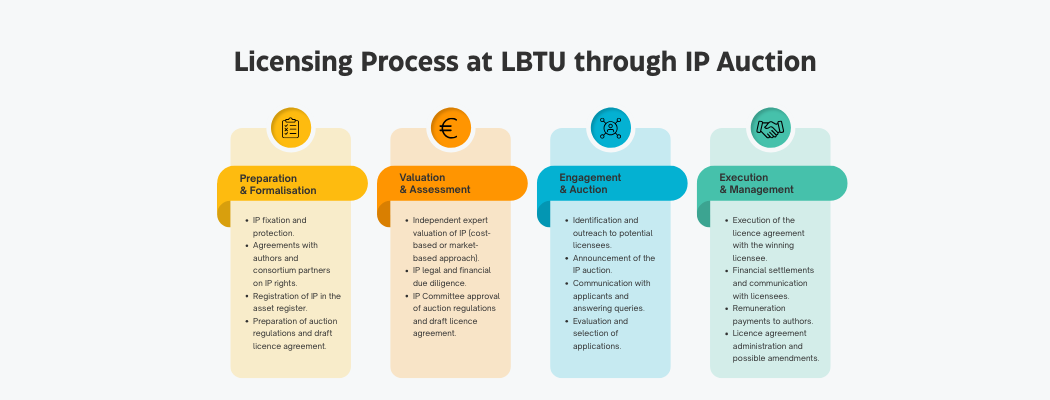LBTU Intellectual Property and Innovation Support

Latvia University of Life Sciences and Technologies (LBTU) supports its employees and students in protecting, managing, and commercialising intellectual property (IP) generated through their research and academic activities. Upon disclosure of new IP, creators are guided by the Technology and Knowledge Transfer Centre (TEPEK), which coordinates the protection, evaluation, and commercialisation processes. TEPEK assigns dedicated support to help navigate patenting, licensing, or collaboration opportunities. Successful IP commercialisation benefits not only the creators and their departments but also LBTU and the wider national economy by turning innovative ideas into competitive products and services. This process also highlights the practical impact of research, strengthening LBTU's role in innovation and knowledge transfer.
LBTU IP Protection Framework
To support this process, LBTU has established the IP Protection Framework – a structured pathway that outlines the key stages from invention disclosure to commercialisation.

The framework ensures timely evaluation of new ideas, proper management of legal rights, and strategic decisions on patenting or alternative protection routes. It also provides guidance on compliance with institutional and funding obligations, while promoting collaboration with industry and other stakeholders. Through this framework, LBTU fosters a culture of innovation, enabling research outcomes to create real-world value.
Benefits for Researchers and Students from IP Patenting and Commercialisation
By protecting intellectual property through patents, researchers at LBTU can safeguard their inventions, enhance their academic profile, and access financial benefits. According to the LBTU Intellectual Property Policy, the University supports the protection and commercialisation of intellectual property created within the scope of academic and research activities. The key benefits include:
Recognition and protection of research results:
Patenting formally acknowledges the novelty and inventiveness of a researcher’s work, securing legal protection for intellectual property and ensuring the inventor’s rights.Recognition in academic performance evaluation:
Patent applications and granted patents – both national and international – are recognised as part of the scientific performance evaluation. As of May 2025, the evaluation criteria have been revised to significantly increase the number of points awarded for intellectual property outputs.Access to institutional support:
Researchers receive assistance throughout the patenting process, with support provided by the LBTU Technology and Knowledge Transfer Centre, including:consultations on patenting strategy and procedures;
legal support in preparing patent documentation;
representation at the Patent Office in matters related to the invention;
engagement of certified patent attorneys, especially for international applications.
Financial support:
The University may cover patent application and maintenance fees using institutional resources, subject to a decision by the Intellectual Property Committee.Opportunities for commercialisation and revenue sharing:
Where appropriate, the University supports the commercialisation of protected intellectual property through licensing, sale or spin-off creation. Researchers are entitled to a share of any income generated from the use or licensing of the intellectual property, as stipulated in the University's revenue distribution model:
| LBTU Net Income (€) | Share to creator (employee or student) | Share to LBTU |
| Up to 70,000 | 70% | 30% |
| 70,001 – 700,000 | 60% | 40% |
| Over 700,000 | 50% | 50% |
Academic and professional advancement:
A granted patent enhances the researcher’s professional profile, strengthens project proposals, and increases visibility in both academic and industry circles.Training and capacity building:
LBTU organises intellectual property awareness training and lectures, ensuring researchers are equipped to manage innovation-related issues effectively.
IP Ownership
If an LBTU employee or student develops, invents, or otherwise generates intellectual property in the course of their employment or academic activities, the economic rights to such intellectual property shall belong to LBTU.
LBTU retains ownership of intellectual property created with the support of its resources, such as funding, facilities, or personnel assistance.
If other people or organisations contribute resources without an agreement with LBTU, ownership rights are shared based on the value of the resources used.
If intellectual property is created as part of research commissioned by another party, the rights belong to that party unless the contract says otherwise.
When intellectual property is created jointly with partners, ownership is shared based on each party’s contribution, with agreements defining the details.
IP Disclosure
Employees and students shall notify LBTU in writing within two weeks after creating any new invention, design, software, or other intellectual property with potential commercial value. This requires completion and submission of an Intellectual Property Disclosure Form.
Before submitting the form, the creator should conduct a preliminary search to check if the invention or design is new and hasn’t been registered or published before. The form must be endorsed by a supervisor or project leader and then submitted to Technology and Knowledge Transfer Centre.
The IP Disclosure Form is important because it allows LBTU to evaluate the intellectual property, decide on protection measures (such as patents or registrations), and manage rights fairly – specially when partners or external resources are involved. This process ensures proper ownership, legal protection, and opportunities for commercialisation.
Within three months of submission, TEPEK communicates the decision on whether LBTU will proceed with protecting the intellectual property or transfer rights back to the creator for independent use.
IP Commercialisation
LBTU commercialises IP by licensing its use or transferring ownership through public auctions. Employees or students who identify commercial interest or see strong market potential can initiate this process by submitting a Commercialisation Form.
Before deciding whether to initiate the commercialisation process, an initial evaluation is carried out, including technical and economic feasibility studies, market analysis, and assessment of potential licensees or buyers. This thorough review ensures that the intellectual property’s commercial potential and risks are fully understood before proceeding. which first reviews the initial evaluation and, if promising, conducts a more detailed analysis of the commercial feasibility and legal rights before deciding whether to proceed.
Using the form helps formalise the process, ensuring clear ownership, fair negotiation, and proper legal protection. TEPEK organises auctions, manages agreements, and oversees revenue sharing with creators. Independent experts value the IP to set auction starting prices, maximizing returns.
This procedure ensures that IP created at LBTU can be effectively marketed, protected, and monetized, benefiting both the university and its innovators.
Licensing Process at LBTU through IP Auction

